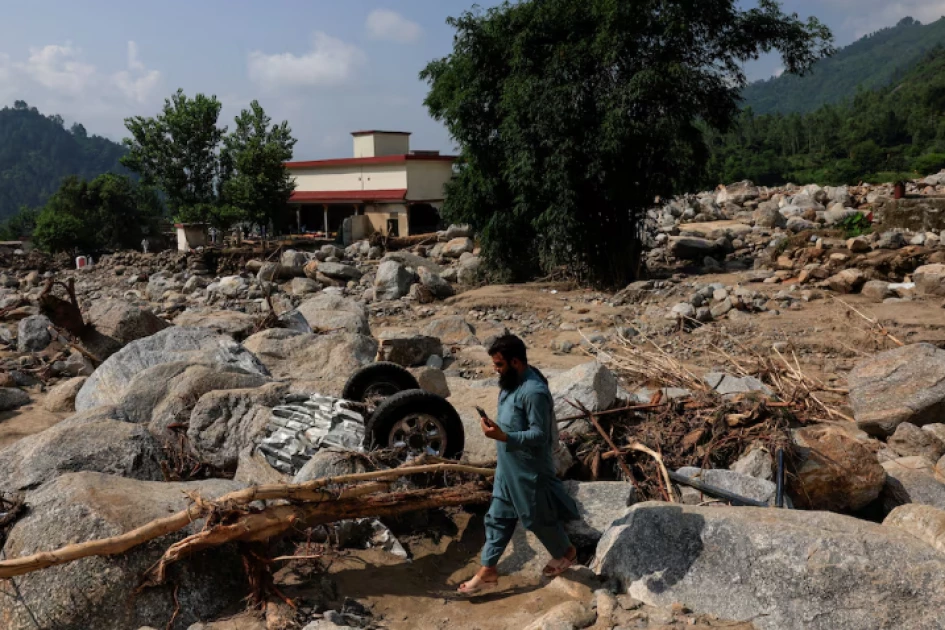Pakistan floods: Wedding celebrations turned into 24 funerals

A resident walks past the remains of a vehicle stucked amid rocks and boulders, following a storm that caused heavy rains and flooding in Qadir Nagar area, in Buner district, Khyber Pakhtunkhwa province, Pakistan, August 21 2025. REUTERS/Akhtar Soomro

Audio By Carbonatix
Two days before his wedding, Noor Muhammad had a long phone
call with his mother, just hours before devastating floods in Pakistan killed
her along with 23 family members and relatives.
"I cannot explain how happy she was," he said, standing by the rubble of his family's large 36-room house, perched on the bank
of a floodwater channel in Qadir Nagar village.
The village in mountainous Buner district has been the worst
hit by recent massive rain in the country, accounting for over 200 deaths out
of nearly 400 in floods in the northwest since August 15.
"Everything was finished," sobbed Muhammad, 25, as
mourners sat at his damaged house to offer condolences, saying there was
nothing left when he got home except for rubble and heavy rocks, which swept
down from the mountains along with mud and raging flood waters, smashing into
houses, markets and buildings.
"The flood came, a huge flood came, it swept away
everything, home, mother, sister, brother, my uncle, my grandfather and
children."
Muhammad works as a labourer in Malaysia. He arrived at the
Islamabad airport on August 15 to drive home, where his wedding preparations
were in full swing for two days later.
They included his mother, a brother and a sister, he said,
adding that his father and another brother survived because they had gone to
pick him up at the airport.
The rest of the fatalities were among his uncles' families
who shared the house built by his grandfather, and relatives who are attending
his marriage.
His fiance survived. Her home was away from the worst of the
damage.
The flash floods triggered by the worst of this year's
monsoon and cloudbursts, which started in the mountainous northwest, have
spread to other parts of the country of 240 million, bringing death and destruction
at a large scale.
Authorities have said the longer spell of heavy rain and
rare cloudbursts was rooted in climate change due to global warming, fearing
the intensity will increase in the coming years.
"We and our elders have never seen a storm like this in
our lives," said Muhammad Zeb, 28, a resident in Buner. It was a complete
chaos and a massive disaster, he added.
"You can see for yourself, this was a beautiful place
with homes. But now, as you can see, the flood and storm have swept everything away."
An unknown number of people remain missing, with dead bodies
still being recovered, officials said.
The overall death toll across the country in the monsoon
rains, which began in late June stood at 776, according to the National Disaster
Management Authority, which said more than 25,000 people had been rescued in
the northwest.
The army and air force have joined the rescue and relief
efforts.
Officials have warned of more storms ahead, with another two
spells of monsoon rain expected until September 10.
Buner received more than 150 mm (5.91 inches)of rain within
an hour, triggered by a cloudburst in the single most destructive event in this
monsoon season.
A cloudburst is a rare phenomenon where more than 100mm (3.9
inches) of rainfall occurs within an hour in a small area.
Only four people of the 28 in his house survived, Muhammad
said.


Leave a Comment